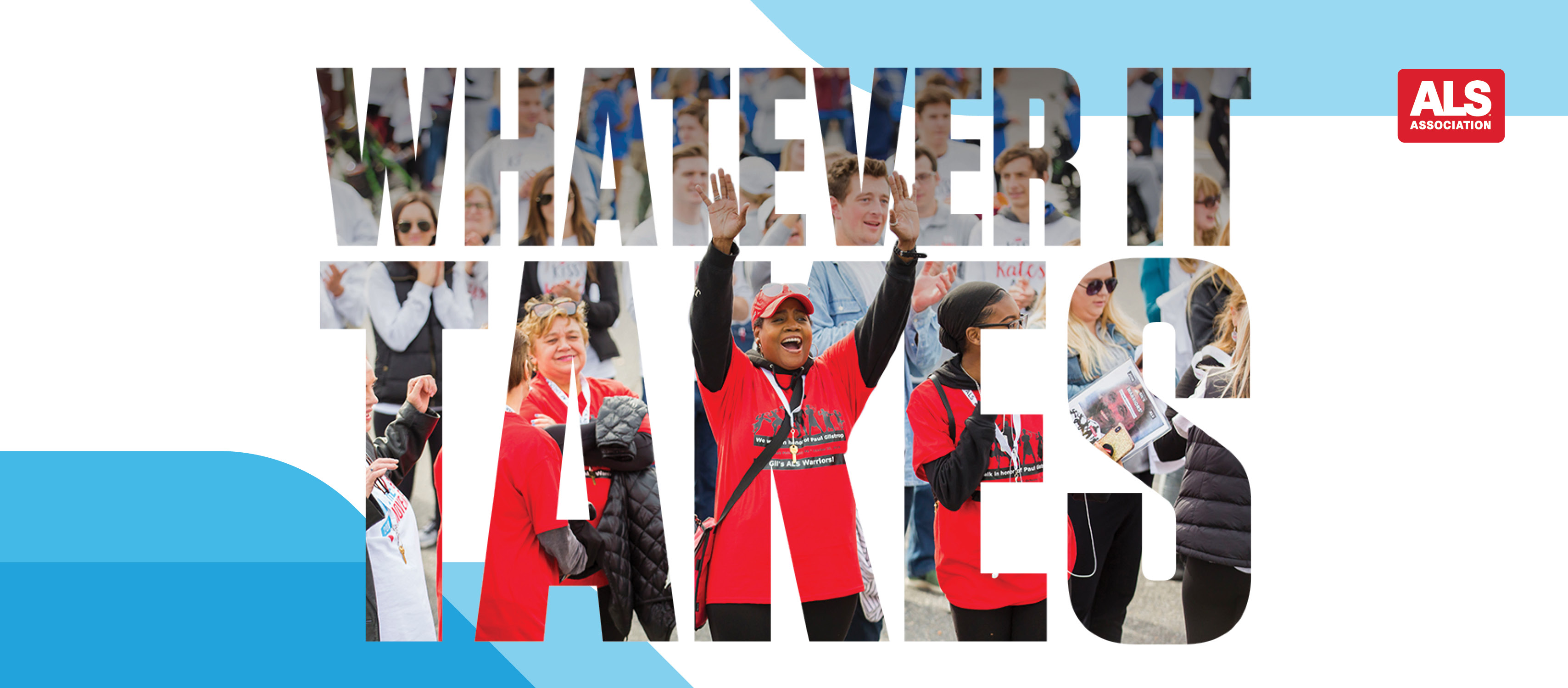We’re Doing Whatever It Takes to Protect Local Care and Mission Delivery
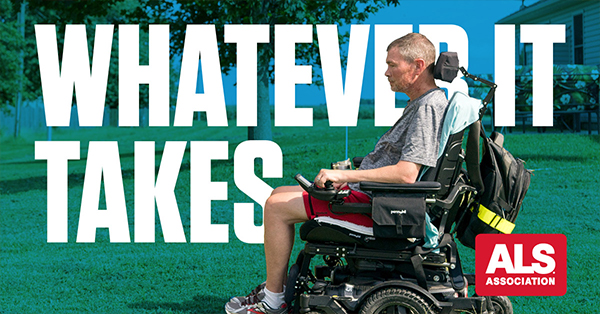
Our recent decision to evolve our current federated business model into a more unified structure signals a bold play to align our chapter network, making us all stronger, more flexible and better connected. This is key to ensuring that our mission will be delivered to a consistently high standard regardless of external influences such as economic downturn or other events that impact local services. Our new model ensures that regardless of local revenue or demand, local care will be administered reliably and effectively.
We’re Doing Whatever It Takes to Find New Treatments and a Cure
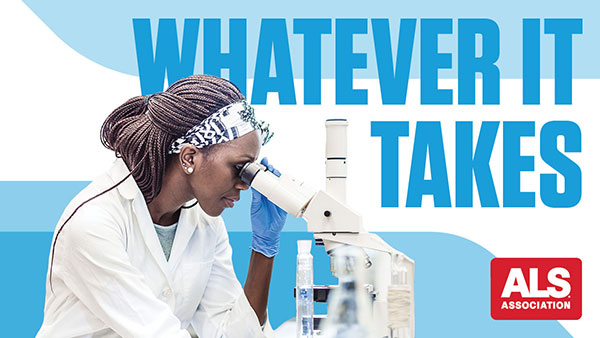
This year alone, we are providing funding for 165 active projects in 11 countries around the world, representing a current commitment of $55M. This is in the context of a total commitment of $118M expended on research since 2015. Here are a few examples of advancements in our research program.
- We launched several new grant funding programs in the search for treatments and a cure. In partnership with The CReATe Consortium, we issued a new request for applications (RFA) to support the discovery and/or validation of biomarkers for ALS, a long-time focus for the Association.
- Additional funding opportunities included grants available through our Milton Safenowitz Postdoctoral Fellowship Program which provides fellowship awards to promising new scientists pursuing ALS research, and The Lawrence and Isabel Barnett Drug Development Program, which brings together pharmaceutical and biotech companies to invest in drug development to rapidly bring potential therapeutics into clinical trials.
- In a study funded in part by The ALS Association’s TREAT ALS program, researchers from Northwestern University have identified the first compound (NU-9) that eliminates the ongoing degeneration of diseased upper motor neurons, a key contributor to ALS. While this study is early in its development, we are encouraged by their findings and proud to be a part of this groundbreaking discovery.
- Research funded by The ALS Association and Project ALS resulted in the announcement by Ionis Pharmaceuticals of FUSION, a Phase 3 clinical trial of ION363 (also known as jacifusen), a novel antisense oligonucleotide (ASO) for ALS patients with a mutation in the fused in sarcoma (FUS) gene. Dr. Neil Shneider and his team at the Eleanor and Lou Gehrig ALS Center at Columbia University Irving Medical Center were able to give 10 additional patients jacifusen while tracking safety data on the drug and disease-relevant biomarkers that helped lead to the phase 3 trial.
We’re Doing Whatever It Takes to Advocate for the Critical Needs of the ALS Community
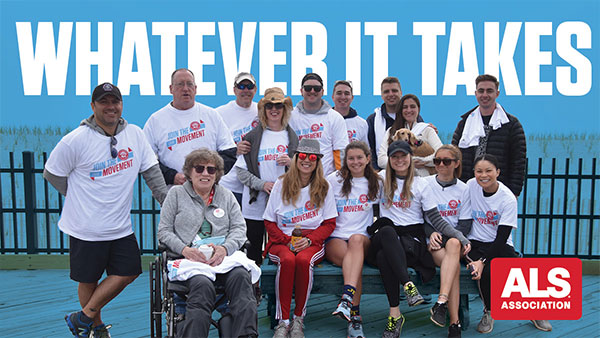
Thanks to the many hard-working ALS advocates around the country, progress is being made in the pursuit of research dollars, expanded urgent access to experimental treatments and critical care for people living with ALS to enable them to live longer lives on their own terms while the search for a cure continues.
- We are leaning on Congress to work with us and the FDA to help expedite approvals for promising treatments for people with ALS.
- The Association hosted a We Can’t Wait Action meeting virtual session that enabled people living with ALS to speak directly to FDA leadership about the need for the agency to expedite access to drugs that show benefit in slowing disease progression, regardless of how modest the benefits may be.
- As follow up to the meeting, we sent a letter to the agency asking it to reaffirm its commitment to the 2019 ALS Guidance and provide us with a detailed report showing how it has implemented the guidance.
- After the FDA responded to our calls for greater urgency, we laid out bold next steps to hold the agency accountable to making promising treatments available as quickly as possible, which were shared in a guest column written by CEO Calaneet Balas in STAT News.
- The Association hosted a We Can’t Wait Action meeting virtual session that enabled people living with ALS to speak directly to FDA leadership about the need for the agency to expedite access to drugs that show benefit in slowing disease progression, regardless of how modest the benefits may be.
- We announced our ambitious public policy priorities for 2021, including $251 million dollars in federal funding, re-introducing ACT for ALS and the Promising Pathway Act (PPA), and permanent access to telehealth for people living with ALS.
- A House Labor-Health and Human Services Appropriations bill passed recently fully funds our requests including $1M for a National Academy of Sciences report to identify and recommend actions to make ALS a livable disease and $10M for the CDC National ALS Registry. The Committee also included our language requesting a CDC plan to enhance the National ALS Registry’s transparency and reporting to better reflect the needs of the ALS community. The language urges continued funding for the National Institutes of Health (NIH) Transformative Research Award program for ALS in FY22. This is in addition to the $3B in funding for the NIH to create the Advanced Research Projects Agency for Health (ARPA-H) to accelerate the pace of scientific breakthroughs for diseases such as ALS, Alzheimer’s, diabetes, and cancer. Altogether, this is a huge win for the ALS community in support of our search for treatments and a cure for ALS. Thank you to the hundreds of #ALSAdvocates who helped secure this funding!
- The Association worked closely with the American Speech-Language-Hearing Association (ASHA) to ensure that five services critical to people living with ALS were added to the telehealth coverage list critical to people living with ALS. Access to telehealth was expanded as part of the government’s response to the COVID-19 pandemic, but that access is currently set to expire after the federally declared public health emergency. We continue to fight for indefinite expanded access, one of our public policy priorities this year. In March, we endorsed the Telehealth Modernization Act to make telehealth permanent for Medicare beneficiaries, an important option for all people living with ALS, now and after the pandemic – both for medical care and increasing opportunities to participate in clinical trials.
- At the end of 2020, The ALS Disability Insurance Access Act went into law, removing the 5-month delay for people with ALS to access their Social Security Disability benefits, marking the culmination of a multi-year fight by ALS advocates across the country. In March, the ALS community experienced another big win when President Joe Biden signed an amendment to the SSDI bill allowing people with ALS immediate access to their benefits, retroactive for any person living with ALS who applied for SSDI before the bill's original enactment.
- Due to the ongoing pandemic and concern for the safety of our community, the National Advocacy Conference was virtual for the second year. After three days of informative updates about the current state of ALS research, care, and advocacy, participants took on the challenge of meeting virtually with members of congress to ensure their voices were heard.
- Nearly 500 participants, including more than 200 people living with ALS and their families participated to learn more about the goal to make ALS livable and discuss the urgent public policy needs of the ALS community.
- Over 340 chapter leaders and ALS advocates shared their personal stories and experience living with ALS with 316 members of congress and their staff.
- More than 1,100 ALS advocates contacted their members of Congress to urge their support of the Promising Pathways and the ACT for ALS Act. Nearly 280 calls were made and over 3,000 letters were sent to members of congress.
- Nearly 500 participants, including more than 200 people living with ALS and their families participated to learn more about the goal to make ALS livable and discuss the urgent public policy needs of the ALS community.
We’re Doing Whatever It Takes to Make ALS a Livable Disease
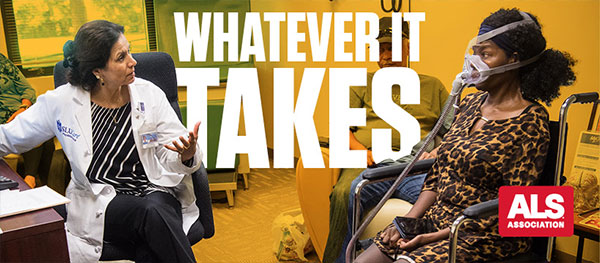
Our work to improve and deliver state-of-the-art care and to make sure the best possible care is available for people living with ALS regardless of where they live is key to making ALS a livable disease while also reducing the physical, emotional, and financial harms associated with the disease.
- In order to make sure health care professionals are providing the best possible care available, our Care Services team provided 12 online, on-demand professional education webinars for professionals interested in ALS treatment and care. All were offered free of charge and approved for continuing education credits for nurses, social workers and allied health professionals.
- A new informational page has been added to the Care Services section of the website, ‘From One Caregiver to Another’, where caregivers and people living with ALS have shared their thoughts and advice so that others can be assured that they are not alone.
- Through the Jane Calmes ALS Scholarship fund, we awarded $500,000 to 100 students for the 2021-2022 school year. The Fund was established in 2019 to help young people impacted by ALS continue their education. Since its inception, we have awarded $1,195,000 in 239 scholarships for students nationwide who are pursuing an accredited college degree or vocational certificate.
- Our nationwide network of chapters showed incredible ingenuity and innovation through the pandemic by implementing digital and socially-distant modes of providing support, resources and care programs to help people affected by ALS improve their quality of life and reduce harms associated with the disease.
- Recognizing that children in families confronting ALS are often called upon to make extraordinary sacrifices, chapters across the country are focusing on the needs of young people affected by ALS.
- The North Carolina Chapter partnered once again with The Joe Martin ALS Foundation as a presenting sponsor of Joe’s Camp. This camp is free to families that have been impacted by ALS. Kids ages 8-17 were invited to a virtual camp full of games, activities, and meaningful interactions.
- The Philadelphia Chapter is hosting a camp for children 7-17 whose family members have been affected by ALS. This gives the children an opportunity to connect with kids that share similar experiences. The activities include sports, hiking, nature center, arts and crafts, and wall climbing.
- The North Carolina Chapter partnered once again with The Joe Martin ALS Foundation as a presenting sponsor of Joe’s Camp. This camp is free to families that have been impacted by ALS. Kids ages 8-17 were invited to a virtual camp full of games, activities, and meaningful interactions.
- Chapters continue to use their resources to hold educational programs to help families who have been affected by ALS.
- The DC/MD/VA Chapter hosted a caregiver conference focused on meeting the emotional needs of ALS caregivers and providing social support for those caring for a person living with ALS.
- The Greater New York Chapter hosted an education and resource summit for their community, Navigating the ALS Journey.
- The South Carolina Chapter began a monthly webinar series to provide pertinent patient/caregiver information focused on people living with ALS and their families in South Carolina.
- The DC/MD/VA Chapter hosted a caregiver conference focused on meeting the emotional needs of ALS caregivers and providing social support for those caring for a person living with ALS.
We’re Doing Whatever It Takes to Raise Awareness and Funds to Help Fight ALS
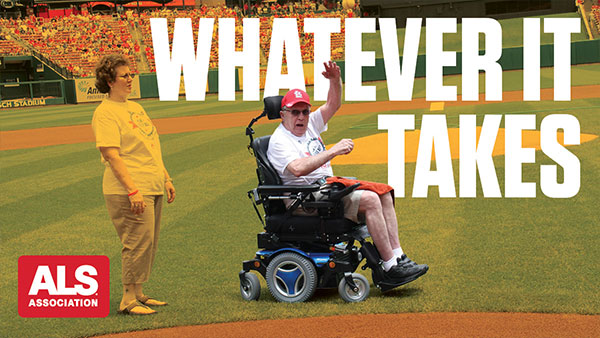
- June 2, 2021, marked a historical moment in the fight against ALS with the official launch of Lou Gehrig Day, now an annual event across Major League Baseball to help spread awareness and raise funds for people living with ALS and their families. With all 30 teams participating, many worked closely with our national network of local chapters to make the day even more memorable for the cause. In stadiums across the nation, teams offered people living with ALS and their families special game day experiences like New York, Seattle and Philadelphia to name just a few. This day would not have been possible without the hard work of members of the Lou Gehrig Day Committee and the ALS community who were determined to make this day a success.
- Walk to Defeat ALS® events returned this spring in several communities around the country as a “Walk Your Way” event. As easing restrictions varied state by state, the Association’s chapters continued to make sure the safety and well-being of people living with ALS and their families, as well as our volunteers and staff, were our highest priority. From car parades in Florida to virtual “Walk in Your Neighborhood” celebrations in the Northwest, the ALS community found unique ways to gather in honor of loved ones with the disease, to remember those who have passed, and to raise awareness and critical funds to support the fight against ALS.
None of these advancements would be possible without the generous support of our donors and partners. To learn more about the work of The ALS Association and how we're doing whatever it takes to make ALS a livable disease, visit ALS.org/whatever-it-takes.
